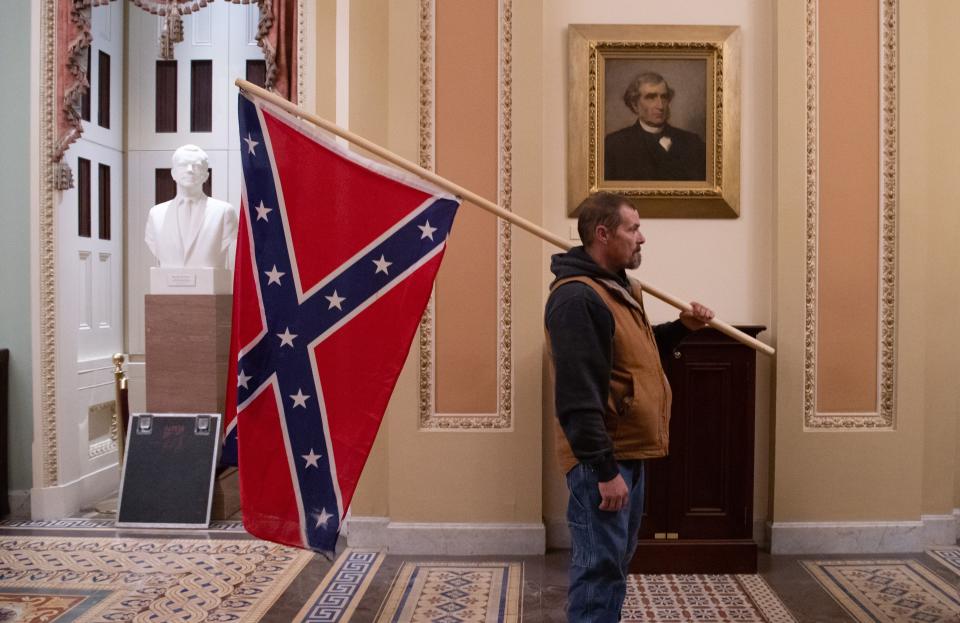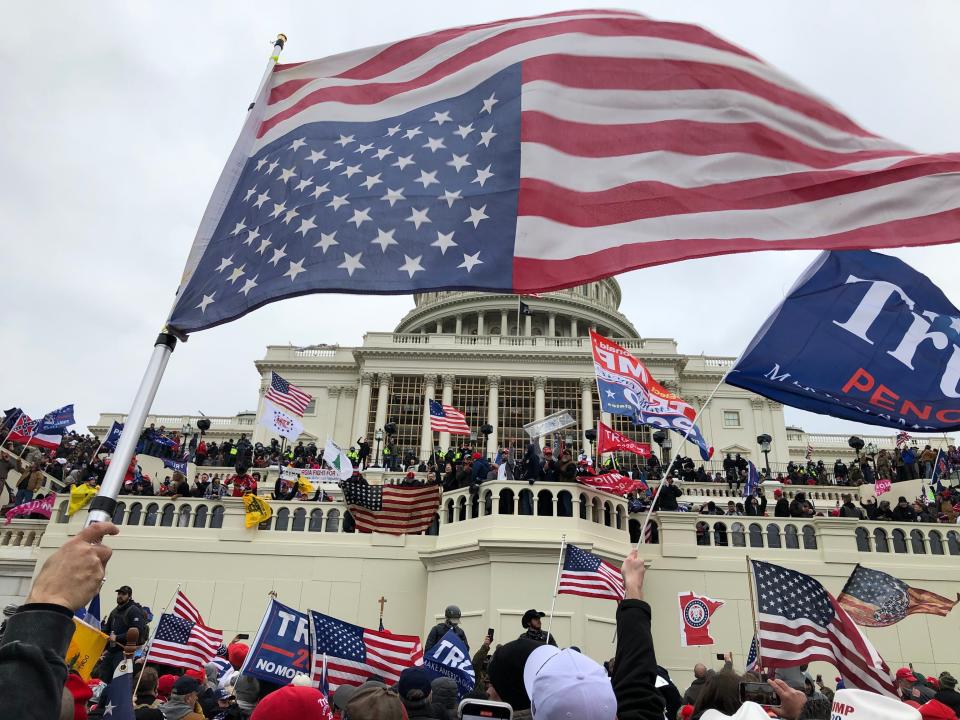Why Confederate flag-carrying Delaware Jan. 6 rioter was granted an early prison release
- Oops!Something went wrong.Please try again later.
The Confederate-flag-toting Delaware man convicted for his role in the Jan. 6 insurrection has been granted an early release from a federal lockup.
Kevin Seefried, a 54-year-old drywall installer from Laurel, is currently serving a three-year prison term after a judge convicted him last year of one felony and a handful of misdemeanors for parading around the U.S. Capitol with a confederate battle flag and threatening a responding police officer during the Jan. 6 insurrection.
However, a federal judge recently ordered his release in the coming month as the U.S. Supreme Court considers whether his most serious felony conviction was fairly applied by prosecutors in his case and the cases of dozens of Jan. 6 rioters.
USA Today coverage: Supreme Court grapples with limits on obstruction charge in Jan. 6 cases

Oral arguments over whether it was legal to apply the felony charge for obstructing a government proceeding to the conduct of the Jan. 6 rioters took place in front of the U.S. Supreme Court Tuesday.
How that charge applies to Seefried's case
Seefried and his adult son, Hunter, stormed the Capitol together after attending the “Stop the Steal” rally, where then-President Donald Trump addressed thousands of supporters in Washington on Jan. 6, 2021. Kevin Seefried was the 12th rioter to set foot inside the building that day, according to prosecutors.
Hunter Seefried was sentenced to two years on similar charges but was also recently released early.
Kevin Seefried was sentenced to three years for the felony obstruction charge and one year for other misdemeanor convictions, to run concurrently with the felony charge.
Now, it's possible that the U.S. Supreme Court could rule the felony charge should not be applied to Jan. 6 rioters.

When the U.S. Supreme Court announced in December that justices would consider the validity of that charge, Seefried renewed his push to be released pending the result of his appeal.
In arguing for his early release, a federal public defender said that the possibility of the Supreme Court overturning his most serious charge means he should not be in prison waiting to see if that happens. They also argued he is not a risk to run from the law.
Federal prosecutors countered that Seefried is a danger, particularly in light of the coming election.
"The Court would be releasing the defendant into the same political maelstrom that led him to commit his crimes in the first place," prosecutors wrote in court filings.
The judge sided with Seefried's attorneys, writing that all of Seefried's other charges tally to a year in prison, so he should serve that before being released pending the outcome of the Supreme Court's consideration of his felony charge.
Recent: Wilmington man pleads guilty to felony for participation in Jan. 6, 2021, Capitol riot
If prosecutors' use of the charge against Jan. 6 defendants is upheld by the high court, Seefried will be ordered back into lockup.
The judge ordered Seefried released one year into his sentence, which would be June. He remains imprisoned in Allenwood, Pennsylvania as attorneys argue over whether his good-time credits earned in prison should apply to the judge's release order.
The debate over the charge
The Supreme Court debate, and the balance of Seefried's potential prison time, centers on the obstruction felony.
While its decision will bear on Seefried's charge, the court is considering the charge in the case of another alleged Jan. 6 rioter: Joseph Fischer, a former police officer.
His attorneys argue that lawmakers created the crime in 2002 following the Enron scandal specifically to target the obstruction of government investigations by destroying evidence like shredding documents, not by parading around the U.S. Capitol in obstructing a congressional proceeding.

The law prohibits individuals from corruptly destroying or concealing government records or obstructing, influencing or impeding any official proceeding. Fischer's lawyers argue that the Jan. 6 conduct does not meet that definition.
But government lawyers have argued the obstruction law is a "catchall” and that it should cover Fischer’s conduct in joining a riot to disrupt the congressional certification of the election results.
What's the larger context?
The case could have a wide impact beyond Seefried's freedom. About 330 of the first 1,265 defendants in the attack were charged under the law, according to the Justice Department.
Additionally, the criminal election interference case against former President Donald Trump relies partially on portions of the same law in controversy.
Trump’s obstruction case is on hold while the Supreme Court considers whether he is immune from all the federal charges. Arguments are scheduled April 25.
Meanwhile, Seefried's son, Hunter, was also convicted of charges related to his presence in the U.S. Capitol on Jan. 6. He received a lesser sentence and was released from prison earlier this year.
Reporting from USA Today contributed to this article.
This article originally appeared on Delaware News Journal: Delaware's Confederate flag carrying Jan. 6 rioter to be released

